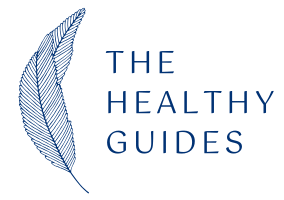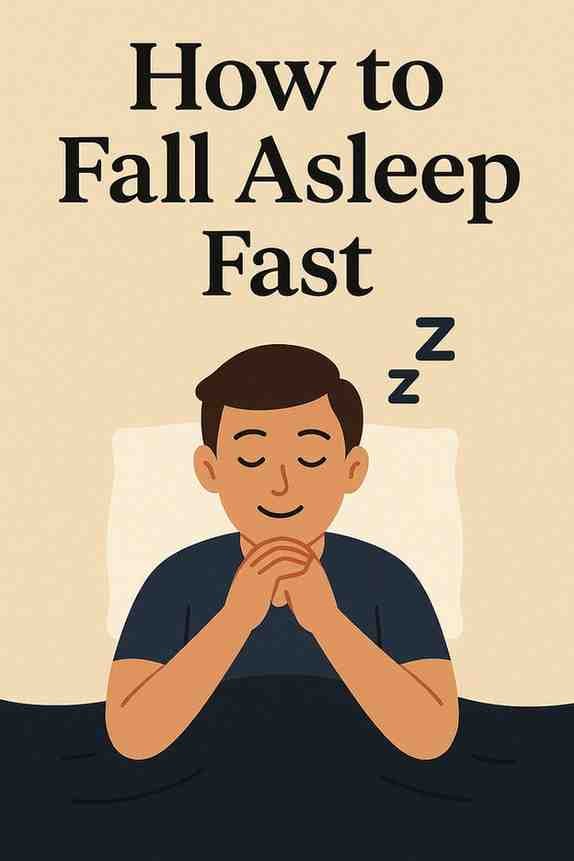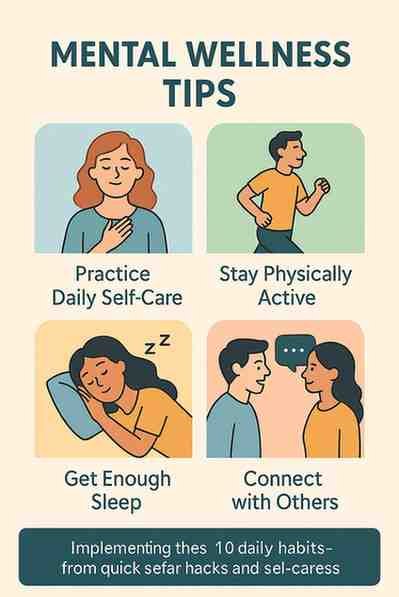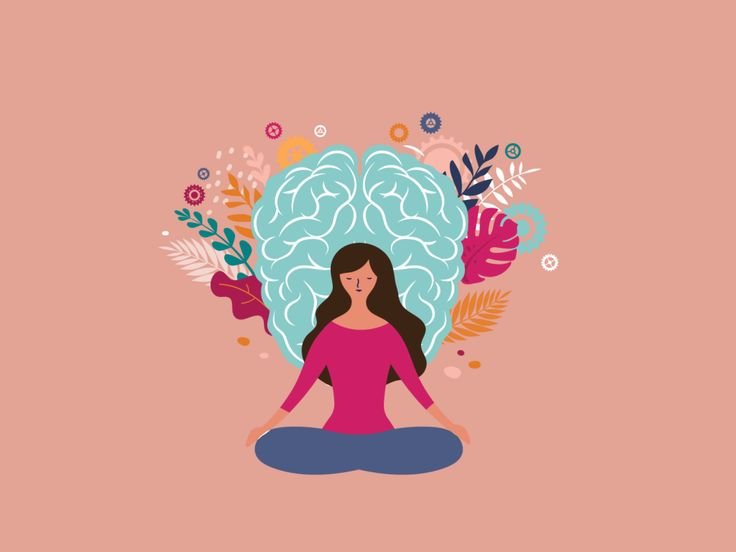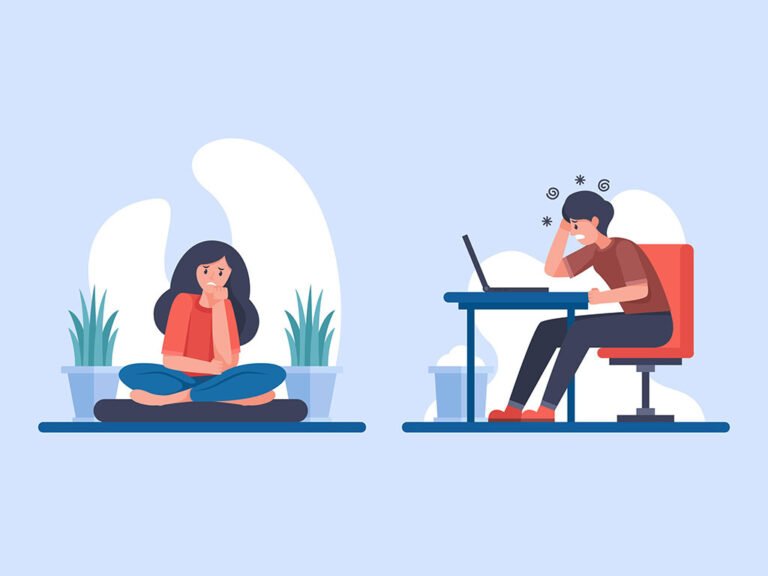🌙 How to Fall Asleep Fast Naturally: 12 Simple Trick Introduction:
You’ve been there: lying in bed, staring at the ceiling, your mind buzzing with unfinished to-do lists, old conversations, or even random thoughts like “Did I leave the fridge open?”. Minutes tick by, frustration grows, and you wonder how you can ever fall asleep fast when your brain refuses to switch off.
The truth? Sleep should be the most natural process in the world—after all, our bodies are wired for it. But modern lifestyles make falling asleep much harder than it used to be. Stress, caffeine, late-night snacking, social media scrolling, and even the glow of your phone can all sabotage your brain’s natural sleep-wake cycle.
The good news? You don’t always need sleeping pills, expensive supplements, or gadgets to get a good night’s rest. With a few science-backed, natural strategies, you can train your body and brain to fall asleep faster, sleep deeper, and wake up refreshed.
In this guide, we’ll explore 12 simple tricks to fall asleep naturally—no counting sheep required.
💤 1. Try the 4-7-8 Breathing Technique
Breathing is one of the most powerful tools for sleep, and the 4-7-8 method—developed by Dr. Andrew Weil—can calm your nervous system almost instantly.
How to do it:
- Inhale through your nose for 4 seconds.
- Hold your breath for 7 seconds.
- Exhale slowly through your mouth for 8 seconds.
- Repeat for 4–5 cycles.
Why it works:
This activates the parasympathetic nervous system, lowering your heart rate, reducing anxiety, and slowing down brain activity. With practice, many people fall asleep in under 1–2 minutes.
Pro tip: Practice during the day, not just before bed, so your body learns the rhythm more easily.
🕯️ 2. Limit Screen Time Before Bed
Ever wonder why you feel wired after scrolling TikTok at midnight? That’s because screens emit blue light, which tricks your brain into thinking it’s daytime. Blue light suppresses melatonin—the hormone that tells your body it’s bedtime.
Tricks to try:
- Shut down devices at least 1 hour before sleep.
- Use “Night Shift” mode or blue-light-blocking glasses if you must use screens.
- Swap scrolling for calming activities: reading, journaling, or listening to soft music.
Think of it this way: Every time you stare at your phone late at night, you’re sending your brain a fake sunrise. No wonder it won’t let you sleep.
🥛 3. Drink Sleep-Friendly Beverages
Instead of coffee, soda, or alcohol before bed (all of which mess with sleep), try these natural bedtime drinks:
- Warm milk → contains tryptophan, which helps produce melatonin.
- Chamomile tea → proven calming effects, reduces anxiety.
- Tart cherry juice → one of the only natural foods that increases melatonin.
- Valerian root tea → mild sedative used for centuries.
⚠️ Avoid drinking too much liquid right before bed to prevent multiple bathroom trips.
🛏️ 4. Optimize Your Sleep Environment
Your bedroom should be a sleep sanctuary. Science says your body falls asleep best in a cool, dark, quiet place.
Checklist for a sleep-friendly room:
- Temperature: 60–67°F (15–19°C).
- Darkness: blackout curtains or eye masks block artificial light.
- Noise: use earplugs, white noise, or calming sound apps.
- Bedding: a supportive mattress and breathable sheets make a huge difference.
Imagine your bedroom as a cave: cool, dark, quiet, and cozy.
🧘 5. Use Relaxation or Meditation Techniques
Sometimes the problem isn’t your body—it’s your racing thoughts. Relaxation practices help your brain “power down.”
Options to try:
- Guided meditation (apps like Calm or Headspace).
- Progressive muscle relaxation: tense and release each muscle group.
- Visualization: picture a calming scene (like floating on a lake).
Even 10 minutes of relaxation can prepare your brain for sleep mode.
🍒 6. Eat Foods That Help You Sleep
Your dinner plate affects your pillow time. Certain foods naturally support sleep hormones.
- Bananas → rich in magnesium + potassium (relax muscles).
- Kiwi → studies show improved sleep quality when eaten before bed.
- Almonds → packed with magnesium for muscle relaxation.
- Oats → trigger melatonin release.
- Cherries & grapes → natural melatonin sources.
✔️ Trick: Choose a small, light snack before bed if you’re hungry—avoid spicy or heavy meals.
🕰️ 7. Stick to a Consistent Sleep Schedule
Your body has a built-in circadian rhythm (sleep-wake clock). If you constantly shift bedtime, your brain gets confused.
✔️ Go to bed and wake up at roughly the same time every day—even weekends. Over time, your body will naturally feel tired at night.
Think of it like training a pet: your body thrives on routine.
🚶 8. Move Your Body (But Not Right Before Bed)
Exercise is a natural sleep aid—it reduces stress, balances hormones, and boosts deep sleep. But timing is everything.
- Morning or afternoon exercise → improves sleep quality.
- Late-night intense workouts → raise heart rate and adrenaline, making it harder to wind down.
- Gentle stretching or yoga before bed is perfect for relaxation.
📖 9. Create a Calming Pre-Bedtime Routine
Your brain loves rituals. A bedtime routine tells your body: “It’s time to rest.”
Ideas for a routine:
- Dim lights an hour before sleep.
- Take a warm shower or bath.
- Read a book (paper, not Kindle).
- Write tomorrow’s to-do list to stop late-night worrying.
Within weeks, your body will automatically get sleepy when your routine begins.
🍵 10. Try Aromatherapy for Relaxation
Scents influence your nervous system more than you think.
Best essential oils for sleep:
- Lavender → reduces anxiety and improves sleep quality.
- Chamomile → soothing and calming.
- Sandalwood → promotes relaxation.
✔️ Use a diffuser, pillow spray, or dilute oils with a carrier for a bedtime massage.
😌 11. Manage Stress and Nighttime Anxiety
Stress is one of the biggest sleep killers. If your mind is replaying the day or planning tomorrow, try:
- Journaling → write down worries to clear mental clutter.
- Gratitude journaling → list 3 positive things to shift focus.
- Cognitive shuffling → mentally list random words until your brain gets bored and drifts off.
Remember: A calm mind = a sleepy body.
⏱️ 12. Use the Military Sleep Method
This method, developed for soldiers, trains the body to fall asleep even in loud, stressful environments.
Steps:
- Relax your face (jaw, eyes, tongue).
- Drop your shoulders and arms.
- Exhale and relax your chest.
- Relax your legs, from thighs to feet.
- Clear your mind for 10 seconds.
If thoughts intrude, visualize floating in a canoe on a calm lake. With practice, you can fall asleep in under 2 minutes.
⚠️ When to See a Doctor
Natural tricks work for most people, but chronic insomnia can signal deeper health problems:
- Sleep apnea
- Anxiety or depression
- Restless leg syndrome
- Thyroid or hormone imbalances
If sleep issues last longer than 3 weeks, consult a doctor.
📝 Conclusion: Natural Habits, Better Sleep
Falling asleep fast isn’t about hacks—it’s about building healthy habits. From the 4-7-8 breathing trick to military sleep methods, these natural strategies help calm your mind and reset your body clock.
Remember: Better sleep = better mood, sharper focus, stronger immunity, and longer life.
Tonight, pick just one or two tricks, try them, and let your body thank you tomorrow morning.
❓ Frequently Asked Questions (FAQs)
1. How to sleep faster?
To fall asleep faster, focus on calming your nervous system. Try the 4-7-8 breathing method, dim the lights an hour before bed, and avoid screens. Creating a consistent bedtime routine and keeping your room cool (60–67°F) also signals your body it’s time to sleep.
2. What helps to sleep better?
Natural ways to sleep better include: eating sleep-friendly foods (like kiwi or almonds), drinking chamomile tea, practicing mindfulness, and sticking to a regular sleep schedule. Good sleep hygiene—a dark, quiet, cool room—is key for better rest.
3. What is the 2-minute sleep method?
The military sleep method is often called the “2-minute sleep method.” It involves relaxing your muscles, slowing your breathing, and visualizing calming images (like floating on water). With practice, many people can fall asleep in under 2 minutes.
4. How to sleep faster without thinking?
If racing thoughts keep you awake, try cognitive shuffling—mentally listing random words like “apple, chair, ocean” until your brain gets bored and drifts off. Journaling your worries before bed or practicing meditation can also stop overthinking.
5. How to fall asleep in 10 seconds?
While rare, some people master the military method and the 4-7-8 breathing trick to doze off in 10–30 seconds. This requires practice, deep relaxation, and a distraction-free environment.
6. What fruit makes you sleepy?
Fruits like kiwi, bananas, and tart cherries are natural sleep aids. Kiwis help increase serotonin, cherries contain melatonin, and bananas provide magnesium, which relaxes muscles.
7. Is it bad to sleep late even if I get 8 hours?
Yes, timing matters. Sleeping late disrupts your circadian rhythm and can affect hormones, digestion, and mood. Aim to sleep between 10 PM and midnight for optimal rest.
8. How long before bed should I stop using my phone?
Experts recommend putting away screens at least 1 hour before bedtime. Blue light from phones and laptops suppresses melatonin, making it harder to fall asleep.
9. Can naps affect my nighttime sleep?
Yes, long or late naps can make it harder to sleep at night. Keep naps 20–30 minutes and avoid napping after 3 PM to protect nighttime sleep quality.
10. What drink helps you sleep instantly?
The best natural drinks for sleep include warm milk, chamomile tea, valerian tea, and tart cherry juice. These contain compounds that promote relaxation and melatonin production.
Remember: your body wants to sleep. Sometimes it just needs a little help remembering how.
If you’re looking for more structured approaches, check out our Diet Plans section for meal guides tailored to weight loss, muscle gain, or balanced living.”
High protein breakfasts aren’t just good for your body—they also stabilize mood and energy, reducing anxiety crashes later in the day. Learn more in our Mental Health section.
For more tips and support, visit our Facebook page.
According to Healthline’s guide on foods that help you sleep, options like kiwi, almonds, and tart cherries naturally support melatonin production and may improve sleep quality.
